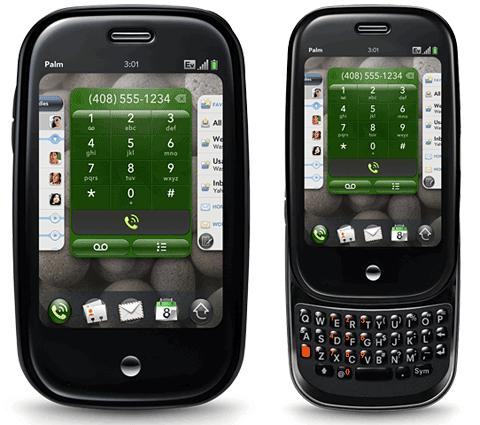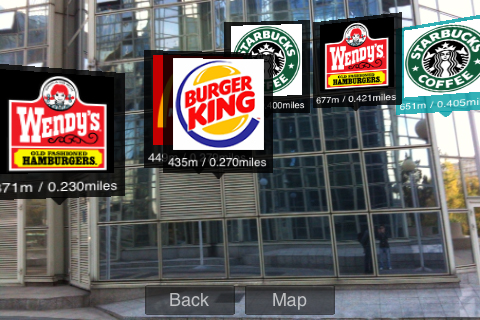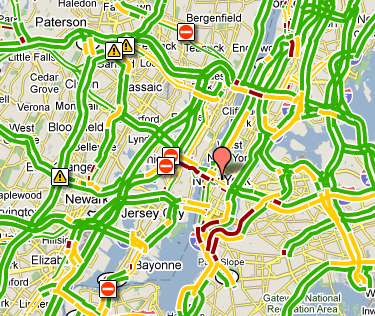Just a few weeks ago the blogosphere was in an uproar about some cell phone tracking software that came pre-installed on the Palm Pre that conveniently sent your location information to Palm HQ. At the time many saw this as a gross invasion of privacy, especially since Palm did not really make it clear to users that this type of activity was going on. They hid it in the privacy policy, expecting users to actually read these things instead of just accepting them so they can get on with using their new toy.
But, according to some interesting patent information recently uncovered, the folks at Palm want to use your location information for a lot more than just helping you use Google Maps. They want to use it to sell you stuff.
Here is the actual language in their patent, taken from the very first line under the claims heading (emphasis mine):
1. A mobile device, comprising: a processor; and a memory coupled to the processor and configured to store user-specific data; wherein the processor is configured to access data indicating a position of the mobile device and provide advertisement data based upon the position of the mobile device and the user-specific data.
To cut through all the patent speak used in this … patent, let’s sum up what they said in the following manner. Palm wants to use your position and information specific to you in order to display laser targeted ads to you on your mobile phone. This then raises the question, What user specific information do they want to use? And how are they going to go about getting this information?
Well, as one might expect, there is more of this information in the patent. The next 5 entries in the patent read as follows (emphasis mine):
2. The mobile device of claim 1, wherein the user-specific data includes data associated with at least one of a date stored in the memory and data provided by an address book of the mobile device.
3. The mobile device of claim 1, wherein the processor is configured to provide the advertisement data further based on a prospective position [presumably from the date book] of the mobile device.
4. The mobile device of claim 1, wherein the processor is configured to provide the advertisement data further based on a historical record of the mobile device, the historical record including a record of at least one of a historical rate of travel of the mobile device and a historical position of the mobile device.
5. The mobile device of claim 1, wherein the processor is configured to access a rate of travel of the mobile device and provide the advertisement data further based on the rate of travel of the mobile device.
6. The mobile device of claim 1, wherein the processor is configured to provide the advertisement data further based on a likely mode of transportation of a user of the mobile device.
 Now if we let ourselves think about this, we can see that this is some pretty scary stuff. Palm just wants to use GPS cell phone tracking to make a buck or two, but they are doing so at the expense of your privacy – and that is just wrong!
Now if we let ourselves think about this, we can see that this is some pretty scary stuff. Palm just wants to use GPS cell phone tracking to make a buck or two, but they are doing so at the expense of your privacy – and that is just wrong!
There are a couple points that are particularly disturbing, and remind me a lot about the decision made by the New York State Court of Appeals that ruled a warrant was needed to use GPS tracking on a suspect. What you will find next is an edited excerpt from the courts majority opinion expressing their deep concern about warrantless GPS tracking:
One need only consider what [companies like Palm] may learn, practically effortlessly, from planting a single device [to track your cell phone with their advertisement driven cell phone tracking software] . The whole of a person’s progress through the world, into both public and private spatial spheres, can be charted and recorded over lengthy periods …. Disclosed in the data retrieved from the transmitting unit, nearly instantaneously with the press of a button on the highly portable receiving unit, will be trips the indisputably private nature of which takes little imagination to conjure: trips to the psychiatrist, the plastic surgeon, the abortion clinic, the AIDS treatment center, the strip club, the criminal defense attorney, the by-the-hour motel, the union meeting, the mosque, synagogue or church, the gay bar and on and on. What the technology yields and records … is a highly detailed profile … of where we go, … of our associations — political, religious, amicable and amorous, to name only a few — and of the pattern of our professional and avocational pursuits. When multiple GPS devices [or cell phones with webOS running] are utilized, even more precisely resolved inferences about our activities are possible. And … it will be possible to tell … who we are and are not with, when we are and are not with them, and what we do and do not carry on our persons — to mention just a few of the highly feasible empirical configurations.

Again, this is talking about the police tracking a suspect with GPS, but it also correlates rather nicely with the activity of Palm in this instance. Do you really want Palm delivering ads on your phone based upon your current destination or one of your previous locations? Is that really going to make your life better?
For example, let’s say that you have been having some bowel problems lately and have been going to get a colonic regularly as part of the treatment. Once you have made a recovery are you going to want to have ads displayed on your cell phone for a colonic every time you drive in the general vicinity of the clinic?
Or what if you made an appointment to get a massage at a local massage parlor. You have never gotten a message before and this place was close to your home when you looked on Google Maps. You add it to your mobile phone’s address book. When it comes time for you appointment you head on over to the massage parlor and you enter it and there are tons of scantily clad Vietnamese women walking around the waiting room. You get this sick feeling that this might not be your sort of massage parlor and you leave.
Well, if you were using a cell phone that didn’t feel a need to invade your privacy and track your position with GPS then this embarrassing experience would be over. However, it seems possible with the vision expressed in the patent application submitted by Palm that you would be reminded of that fateful day with advertisements as you head in that general direction. Yuck.
Then there is the issue of what Palm could do when they start correlating different pieces of data between cell phone users. Let’s say that you are a generally very respectable, moral person who attends an event that draws people from a bunch of different backgrounds. It could be a church service, or a PTA meeting, or even just a mom event at a park. Now let’s say that another person who attends these events does not necessarily hold the same value system that you do – they could drink, or smoke, or go to clubs, or do something else that you don’t necessary disapprove of, but certainly don’t want to do yourself. Now, would you want Palm to suppose that because you meet with this person you also must like doing what they do and therefore display ads for these activities on your cell phone?
While this last scenario isn’t necessarily in the patent information, it sure seems possible – and that possibility is scary. What business does Palm have knowing this type of information about us and serving advertisements on our cell phones? I think that this is pretty bad and should be stopped.
Now I need to make it clear that I don’t think GPS tracking is bad in and of itself. I think that it can be a great way for a business to improve efficiencies by tracking their fleets. Fleets that utilize GPS for the purpose of driver routing and maintenance have been able to realize huge cost savings and increase the overall output of their fleets. This is a great way for businesses to utilize GPS tracking, whether by cell phones or by traditional GPS tracking devices, and to benefit their companies bottom line.
But a business should never invade their users privacy so that they can better target them with advertising – that is just lame.
Another perfectly viable use of GPS tracking in my opinion is the use of this technology by the police to catch criminals. While some may think it odd that I think that the police can track a suspect without the use of a warrant in light of my disgust with Palm for invading their users privacy, I don’t see a contradiction. The police are trying to uphold justice – catch murders, stalkers, rapists, thieves, etc – while Palm is just trying to make an extra buck. Which aim do you think is a little more noble?
Another perfectly legitimate use is to track family members, such as your child, teenager, or spouse. I think that this is entirely in line with the dynamics of a family and the way that it ought to work, as long as GPS is used as a supplement to good parenting techniques and with open communication between spouses. It should never be used as a replacement for these things, and if it is it is being used poorly.
GPS tracking is also great in fitness applications. GPS running watches are just one of the many different ways that tracking technology has been appropriated for use in fitness. These devices are powerful training computers that fit easily on your wrist and work, look, and feel like a regular watch that has all the power of GPS infused within it. When paired with a heart rate monitor there are few things that can compare to the power of a GPS tracking watch.
Finally, GPS tracking is also a great way for people to stay connected with friends and family. The cheapest alternative out there is certainly the cell phone, and this is why it is so tragic that Palm is turning GPS enabled phones into privacy invading devices. All that you needed to do to make your phone into a GPS tracking cell phone was download some free GPS software and you were already well on your way to having an easy to use tracking system for your family or friends to use to find you. Now that Palm is invading your privacy many people might be more wary of pursuing this route, and that is unfortunate in my opinion.
While there is little doubt that GPS tracking is always going to have a commercial aspect to it, it is sad that the desire to make money off of position data has led some companies *cough*Palm*cough* to disregard their user’s privacy and use their information without communicating it to them in a useful way. I hope that other cell phone companies and GPS tracking providers are watching this debacle and learning the lessons the easy way: don’t steal users GPS location information for advertising – make sure they opt in to it themselves!
Related Information:
Palm’s Patent Application






 Now if we let ourselves think about this, we can see that this is some pretty scary stuff. Palm just wants to use GPS cell phone tracking to make a buck or two, but they are doing so at the expense of your privacy – and that is just wrong!
Now if we let ourselves think about this, we can see that this is some pretty scary stuff. Palm just wants to use GPS cell phone tracking to make a buck or two, but they are doing so at the expense of your privacy – and that is just wrong! Well, there are a couple different things that this Internet giant could by trying to accomplish by using cell phones to track cars and get accurate traffic information. The first is the most obvious: they want to improve their current product and services. Google Maps is a wildly popular web application and is becoming just as popular on mobile phones. If they can increase this application’s usefulness they can solidify their user base and create lots of Google Maps evangelists. This could cut into the market share of other online map providers like MapQuest and MSN.
Well, there are a couple different things that this Internet giant could by trying to accomplish by using cell phones to track cars and get accurate traffic information. The first is the most obvious: they want to improve their current product and services. Google Maps is a wildly popular web application and is becoming just as popular on mobile phones. If they can increase this application’s usefulness they can solidify their user base and create lots of Google Maps evangelists. This could cut into the market share of other online map providers like MapQuest and MSN.